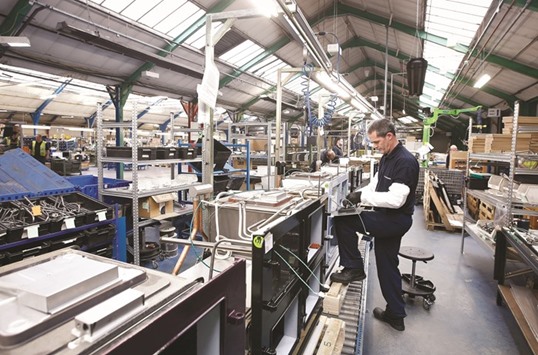British industrial output rebounded in November, helped by a recovery in oil and gas, adding to signs that the economy kept its momentum in late 2016 despite June’s shock Brexit vote.
But Britain’s trade performance deteriorated on the month, as a record value of goods imports outweighed exports which also hit an all-time high, showing the pound’s drop since the referendum has yet to improve Britain’s balance of trade.
The Office for National Statistics said yesterday that industrial output rose 2.1% in November alone, recovering from a 1.1% drop in October and beating expectations for a 0.8% jump in a Reuters poll of economists.
Sterling tipped below $1.21 for the first time since October 25 despite the strong data, as markets continued to worry that Britain will end up with a poor deal after its divorce from the European Union.
Separate figures from the ONS showed Britain’s goods trade deficit with the rest of the world widened to £12.2bn ($14.8bn) in November, bigger than all forecasts in the poll.
The resilience of Britain’s economy since June’s decision to leave the EU has been due almost entirely to the country’s services sector, with industrial output broadly flat over the last few months.
“So far the pace of activity has held up well since June’s EU referendum,” said Philip Shaw, economist at Investec.
“But as yet there seems to be little or no response from the volume of exports to sterling’s 15% trade weighted depreciation over the past 12 months.”
The large increase in industrial output in November largely reflected the reopening of the Buzzard oilfield in the North Sea — responsible for around a tenth of Britain’s oil output — and an increase in pharmaceuticals production, which is volatile.
Output in manufacturing rose 1.3% following a 1.0% contraction in October, compared with a forecast for a 0.5% increase in a Reuters poll.
Yesterday’s figures may suggest that British economic growth is starting to become better balanced, said Paul Hollingsworth, UK economist at Capital Economics.
He cited volumes of exports and imports rising 1.1% and 1.8% respectively in the three months to November. Figures for the three months to October had previously shown falling exports and a rise in imports.
In November alone, the value of goods exports increased to £27.0bn, but imports also hit an all-time high of nearly £39.2bn, with both figures boosted by sterling’s fall that has started to fuel inflation.
Britain’s trade deficit with the EU widened to a record £8.586bn.
Supporters of Britain’s exit from the EU have said the size of the deficit strengthens the country’s hand in the upcoming Brexit negotiations with the rest of the bloc.
The ONS also released figures for construction output in November, which fell 0.2% on the month and rose by 1.5% on the year.
The Reuters poll had pointed to growth of 0.3% on the month and 2.0% on the year.

Employees work on a cooker production line at AGA Rangemaster’s plant in Telford. The UK’s manufacturing output rose 1.3% following a 1.0% contraction in October, compared with a forecast for a 0.5% increase in a Reuters poll.
